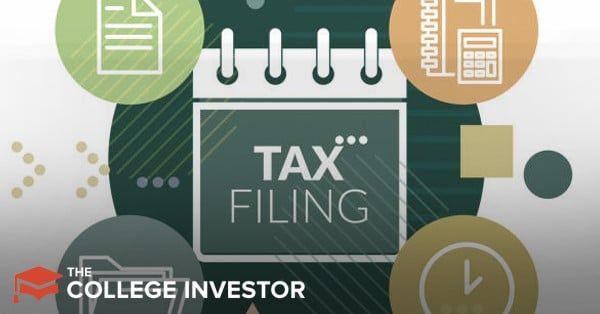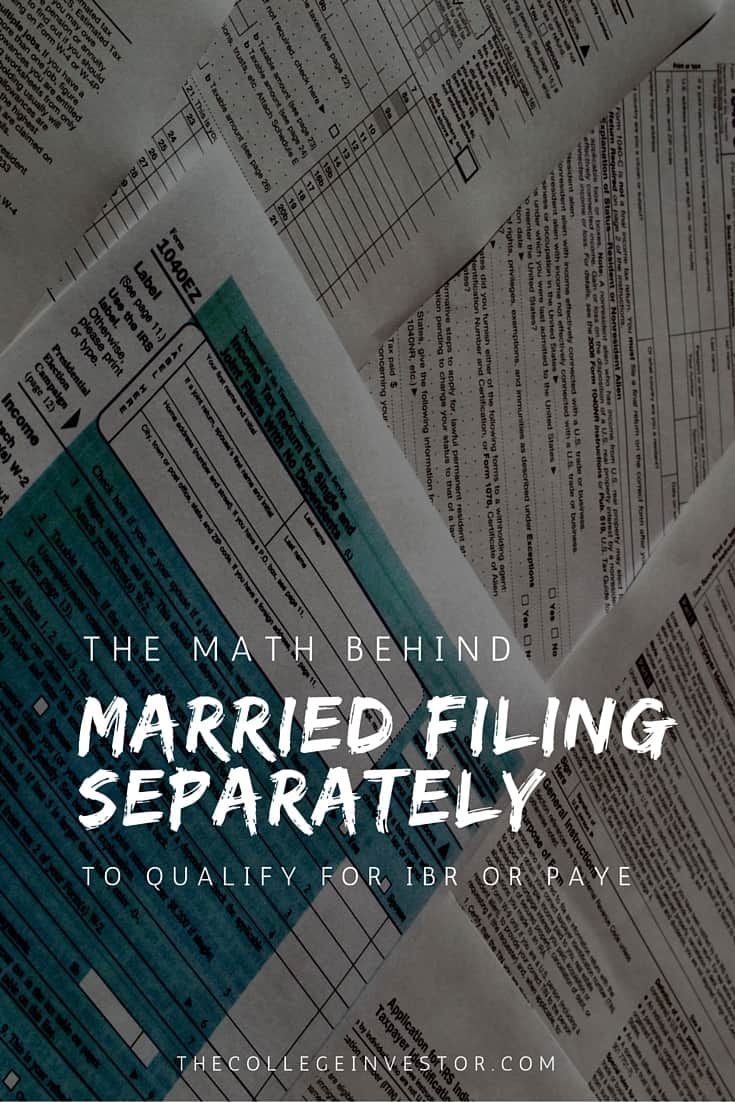
For married couples with student loan debt, one of the most popular strategies for lowering your monthly student loan payment and potentially qualifying for more student loan forgiveness is to file your taxes "married filing separately".
For income-driven student loan repayment plans like Income Based Repayment (IBR), Pay As You Earn Repayment (PAYE) and now Saving on a Valuable Education (SAVE), your monthly student loan payment is calculated based on your Adjusted Gross Income (AGI). If you're married and file a joint tax return, your monthly student loan payment is calculated on your joint AGI.
So, a simple way to potentially lower your student loan payment and increase your potential student loan forgiveness is to lower your AGI - and married couples can potentially do this by filing separately versus jointly.
If you're not quite sure where to start or what to do, consider using a service like Chipper to help you understand the best options for your student loans. Chipper will help you make the smartest decision for your student loan debt. Check out Chipper here >>
Editor's Note: This article has been updated to incorporate the changes to RePAYE and the new SAVE repayment plan.
The Problem With Married Filing Separately For IBR, PAYE, or SAVE
There are two big issues to consider with this approach. First, this doesn't apply to the Revised Pay As You Earn Repayment Plan (RePAYE). With RePAYE, no matter how you file your taxes, the married joint AGI is what is taken into consideration.
However, starting in 2023, if you switch to the SAVE repayment plan, your individual AGI will be used if your file your taxes married filing separately. Those already enrolled in the RePAYE plan will automatically switch to SAVE (it's effectively a rebrand). For those on another plan, you can switch to SAVE manually by going to StudentAid.gov or going through your loan servicer.
Note: The lower SAVE repayment plan amount (using 5% of discretionary income) doesn't go into effect until 2024, but the married filing separately aspect goes into effect in 2023.
Second, and typically a bigger issue, is that the math doesn't always make sense to do it. You see, when you file separately, you typically also have to pay more in taxes as a couple. As such, you have to outweigh the potential savings from your student loan debt against the higher taxes you'll face. Even if you save a little on your monthly student loan payment, it might not outweigh the higher taxes you'll face each year.
Let's look at a couple of scenarios and see how the math behind married filing separately for IBR and PAYE really works.
The Sweet Spot For Married Filing Separately For Student Loan Payment Minimization
Note: This article has been updated to reflect the SECURE Act tax changes. If you've viewed this article before, you may have noticed the numbers have changed. One of the changes if you cannot deduct your student loan interest if you file separately.
Let's start with the ideal scenario, because that's what everyone cares about. So, let's set up this scenario as it's pretty typical. We have a couple, with Person A and Person B. They have one child that is 10 years old.
Person A makes $40,000 per year and has $50,000 in Direct Loans.
Person B makes $60,000 per year and has no student loan debt.
Let's look at how their tax return looks. For simplicity, both partners only have W2 income for their AGI.
Married Filing Separately Versus Jointly | |||
|---|---|---|---|
Person A | Person B | Joint Return | |
Earnings | $40,000 | $60,000 | $100,000 |
Student Loan Interest Deduction | $0 | $0 | $2,000 |
Adjusted Gross Income | $40,000 | $60,000 | $98,000 |
Standard Deduction | $12,000 | $12,000 | $24,000 |
Itemized Deductions | $0 | $0 | $0 |
Taxable Income | $28,000 | $48,000 | $74,000 |
Regular Tax | $3,173 | $6,500 | $8,499 |
Tax Credits (Child Tax Credit) | $2,000 | $0 | $2,000 |
Taxes Net Of Credits | $1,173 | $6,500 | $6,499 |
As you can see in the above example, this couple saves $1,174 per year in taxes by filing jointly.
However, Person A also has that $50,000 in Direct Loans. If this couple files a joint tax return, they do not qualify for IBR or PAYE. If we assume this couple is looking for the lowest payment option for their loans, the best option is the Extended Repayment Plan. Their payment would be $347 per month for 300 months (25 years) - the same length as IBR. That equates to $4,161 per year.
Now, if this couple files married filing separately on their taxes, they will pay $1,174 more per year. But it opens up more repayment options for Person A. For example, Person A will now qualify for IBR, PAYE, and SAVE.
For PAYE, the monthly payment will $74 per month, with the potential for loan forgiveness of $64,424 after 240 months.
For IBR, the monthly payment will be $100 per month, with potential loan forgiveness of $11,948 after 300 months.
So, if Person A switches to PAYE, they will save $273 per month in student loan payments alone. That equates to a savings of $3,276 per year in student loan payments.
So let's combine both the higher taxes and lower student loan payments and see what we get:
Student Loan Savings By Filing Separately | ||
|---|---|---|
Filing Jointly | Filing Separately | |
Total Tax Due | $8,499 | $9,673 |
Total Annual Student Loan Payments | $4,161 | $888 |
Total | $13,521 | $10,561 |
So, by making the switch from filing jointly to filing separately, you can expect to save $2,960 per year. Plus, you put yourself on track for potential student loan forgiveness after 20 years as well.
When It Doesn't Make Sense To File Separately For IBR, PAYE, or SAVE
There are a few scenarios where it doesn't make sense to file separately in order to save on your student loan payments. However, everyone should run the math for their unique situation to decide for themselves.
Some rules of thumb for when it might not make sense:
- When the student loan borrower makes more
- When the income of the borrower wouldn't qualify for IBR, PAYE, or SAVE separately
Easy Ways To Do The Calculations
This may seem a bit overwhelming because there is a lot of math and scenarios to plan for. However, most tax software programs allow you to calculate the difference in taxes you'd pay under both married filing jointly and married filing separately. If you utilize an accountant to help with your taxes, they should also be able to provide you with the differences as well.
Then, you can look at your Federal loan repayment options on the Department of Education Loan Simulator.
Finally, you just add up the costs. You can use the chart above as a guide to see how your tax and student loan payments would add up, and see which way to file your taxes saves you the most money in total.
What About The "Tax Bomb"?
A lot of people get concerned about the potential for a tax bomb due to the loan forgiveness associated with income-driven repayment plans.
And while this is a valid concern, we don't think it will apply to most borrowers.
First, there is no federal income tax on student loan forgiveness through 2025. However, there may be state taxes on student loan forgiveness.
Second, most borrowers won't have to worry about a tax bill due to an IRS rule called insolvency. We break down all the math and explain it here: Student Loan Discharge and Insolvency.
Furthermore, it's not something you should even worry about. Instead, focus on finding a repayment plan that you can afford each month, and then reassess as your income rises over time. The worst thing you can do with your student loans is to avoid making payments. Even an income-driven payment is better than nothing.
Get Professional Help
If you're not quite sure where to start or what to do, consider hiring a CFA to help you with your student loans. We recommend The Student Loan Planner to help you put together a solid financial plan for your student loan debt. Check out The Student Loan Planner here.
You can also always call your lender, but they might not be able to help with this complex situation over the phone.
Conclusion
Depending on your tax situation and student loan amount, it could save you money to file your taxes married filing separately so that you can qualify for IBR, PAYE, or SAVE and save on your student loans. However, you have to remember that you'll pay more in taxes, so it's important to do the math and see what scenario makes the most sense for you.

Robert Farrington is America’s Millennial Money Expert® and America’s Student Loan Debt Expert™, and the founder of The College Investor, a personal finance site dedicated to helping millennials escape student loan debt to start investing and building wealth for the future. You can learn more about him on the About Page or on his personal site RobertFarrington.com.
He regularly writes about investing, student loan debt, and general personal finance topics geared toward anyone wanting to earn more, get out of debt, and start building wealth for the future.
He has been quoted in major publications, including the New York Times, Wall Street Journal, Washington Post, ABC, NBC, Today, and more. He is also a regular contributor to Forbes.
Editor: Clint Proctor Reviewed by: Chris Muller
